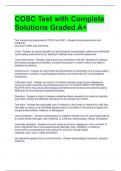COSC Test with Complete
Solutions Graded A+
Two overarching objectives of COSC and OSC - Answer-force preservation and
readiness
long term health and well being
Crisis - Answer-an acute disruption of psychological homeostasis, where and individuals
usual coping mechanisms fail, leading to distress and functional impairment.
Crisis intervention - Answer-urgent and acute emotional "first aid" designed to stabilize
and reduce symptoms of distress, to assist the person in crisis to return to a state of
adaptive functioning.
Critical event - Answer-an event that has the potential to overwhelm one's usual coping
mechanisms, resulting in psychological distress and impairment of normal adaptive
functioning.
Traumatic event - Answer-an event or condition (outside usual human experience)
occurring under traumatic circumstances (such as TO CAUSE DEATH OR GRAVE
INJURY) which may cause physiological and behavioral reactions and present coping
difficulties for the individual experiencing them.
Disasters - Answer-a state of massive collective stress caused by an external calamity
over which neither the affected individual nor the society has control.
Terrorism - Answer-the calculated use of violence or the threat of violence to instill fear;
intended to coerce or to intimidate governments or societies in the pursuit of goals that
are generally political, religious, or idealogical.
natural disasters - Answer-a geophysical or weather related event of such magnitude as
to cause severe damage, loss, hardship, or suffering. (earthquakes, floods, tornadoes)
manmade disasters - Answer-an event cause by human negligence, error, or intent of
such magnitude that is has caused severe damage, loss, hardship, or suffering.
more serious consequences than natural for survivors mental health
(airplane, auto, train, nuclear accidents)
two reactions people have to critical events - Answer-psychological reactions, physical
reactions
, predominant psychological reaction - Answer-hypersensitivity to the traumatic event
intrusive memories of the trauma
represents victims attempts to resolve or find meaning in the trauma
Traumatic events do.. - Answer-contradict or violate some aspect of victims worldview.
no longer interpret their environment as safe or secure.
causes hyper-vigilance, loss of internal control beliefs, fear, uncertainty, hopelessness,
panic, abandonment, violation of trust.
psychiatric diagnoses frequently seen.. - Answer-organic mental disorders secondary to
head injury, toxic exposure, illness, and dehydration.
acute stress disorder
adjustment disorder
substance use disorders
PTSD
generalized anxiety disorder
depression
physical reactions - Answer-initial exposure to event causes "fight, flight, or freeze"
response. sympathetic nervous system is stimulated and threshold for neurological
hyper excitation is decreased.
state of chronic hyper arousal develops
anxiety, fear, irritability, encoding of traumatic memories, hyper vigilance, psychic
numbing symptoms, substance abuse
variables that influence effects of critical events - Answer-duration, cause of disaster,
acute or protracted, available support systems, maladaptive coping skills, injury or
disability.
key elements of terrorism - Answer-calculated use of violence, or threat of violence
instillation of fear
intimidation of the audience (governments, officials, corporations, people)
pursuit of various goals for political, religious, or idealogical reasons.
goals of terrorism - Answer-induce state of psychological uncertainty, personal
vulnerability, and fear
flaunt the powerlessness of the authorities, to prevent attacks and cause the population
to doubt authorities ability to govern
provoke a repressive response from the governments toward their citizens. promote
lack of trust in the population
turn the local population/world organization against the authorities
utilize available media resources to gain attention
terrorist tactics - Answer-assassination, arson, bombing, hostage taking, kidnapping,
raids, seizure, sabotage, hijacking, hoaxes




